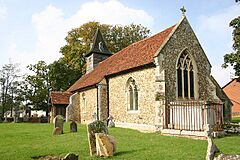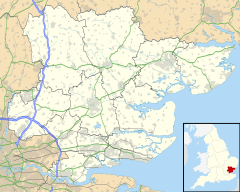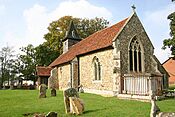Little Yeldham facts for kids
Quick facts for kids Little Yeldham |
|
|---|---|
 St. John the Baptist church, Little Yeldham |
|
| Population | 355 (2021) |
| OS grid reference | TL775395 |
| District |
|
| Shire county | |
| Region | |
| Country | England |
| Sovereign state | United Kingdom |
| Post town | Halstead |
| Postcode district | CO9 |
| Dialling code | 01787 |
| Police | Essex |
| Fire | Essex |
| Ambulance | East of England |
| EU Parliament | East of England |
| UK Parliament |
|
Little Yeldham is a small village found in the northwest part of Essex, England. It is located about one mile northeast of a larger village called Great Yeldham. In 2021, about 355 people lived in Little Yeldham.
Contents
A Look Back in Time
The village of Yeldham, which included both Little Yeldham and Great Yeldham, is mentioned in a very old book called the Domesday Book. This book was created in 1086 for William the Conqueror. It recorded details about land and people across England.
What the Domesday Book Says
The Domesday Book shows that Yeldham was part of an area called the Hinckford hundred. A "hundred" was an old way of dividing up land. In 1086, Yeldham had about 40 households. This means around 40 families lived there. The land was owned by four different important people: Count Eustace, Count Alan, Richard son of Gilbert, and Ranulf brother of Ilger.
Village Population Over Time
In 1818, the population of Little Yeldham was 221 people. At that time, 56 children attended the local Sunday School. By 1833, the population had grown to 371 people. The Sunday School also had more students, with 71 children attending. This included 31 boys and 40 girls.
Important Buildings
One of the most important buildings in Little Yeldham is the St John the Baptist church. It stands on the east side of the village.
About the Church Building
The church walls are made from a mix of flint and pebble rubble, which are types of stone. The roofs are covered with tiles. The main part of the church, called the nave, was likely built a very long time ago, between the 12th and 13th centuries. However, the west wall was rebuilt in the 1800s. The chancel, which is the area around the altar, was rebuilt in the 15th century. The church also has two bells. People believe these bells were made by a bell-maker named Miles Graye in 1674.
 | Percy Lavon Julian |
 | Katherine Johnson |
 | George Washington Carver |
 | Annie Easley |



